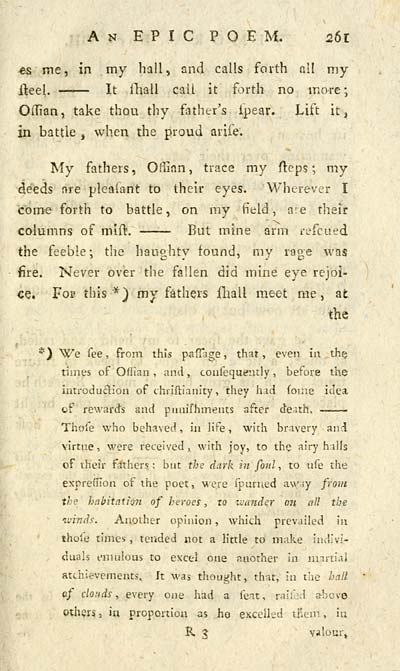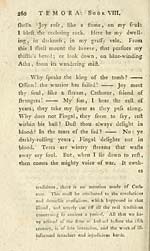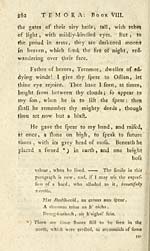Download files
Complete book:
Individual page:
Thumbnail gallery: Grid view | List view

A N E P I C P O E M. 261
es me, in my hall, and calls forth nil my
il:eel. It lliall call it forth no more;
OiTian, take thou thy father's ipear. Lift it,
in battle , when the proud ariie.
My fathers, Oflian, trace my flops; my
deeds are plealant to their eyes. Wherever I
come forth to battle, on my field, are their
columns of mift. — — • But mine arm refc ued
the feeble; the haughty found, my rage was
fire. Never over the fallen did mine eye rejoi-
ce. For this *) my fathers fliall meet me, at
the
*) NJC^'e fee, from this pafTiige , that, even in tht;
times of Ofilaii , and , confequently , before the
Introduclion of chriftianlty , they h^id foi:ie idea
cf reward's and punifhments after deith.
Thofe who behaved, in life, with brivery and
virtue , were received , with joy, to the fi'i'y h ills
of their fathers: but the dark in foul, to ufe the
expreffion of the poet, were fpurued aw;iy from
the habitation of heroes, to ivander ort all the
tvinds-. Another opinion , which prevjiled in
thofe times , tended not a little to make iuvlivl-
duals emulous to excel one another in martial
atthlevemcnts. It was thought, that, in the hall
cf clouds, every one had a feat, raih?d above
others 5 iu propoitiou as ho excelltid iHem , iti
R. 3 valour^
es me, in my hall, and calls forth nil my
il:eel. It lliall call it forth no more;
OiTian, take thou thy father's ipear. Lift it,
in battle , when the proud ariie.
My fathers, Oflian, trace my flops; my
deeds are plealant to their eyes. Wherever I
come forth to battle, on my field, are their
columns of mift. — — • But mine arm refc ued
the feeble; the haughty found, my rage was
fire. Never over the fallen did mine eye rejoi-
ce. For this *) my fathers fliall meet me, at
the
*) NJC^'e fee, from this pafTiige , that, even in tht;
times of Ofilaii , and , confequently , before the
Introduclion of chriftianlty , they h^id foi:ie idea
cf reward's and punifhments after deith.
Thofe who behaved, in life, with brivery and
virtue , were received , with joy, to the fi'i'y h ills
of their fathers: but the dark in foul, to ufe the
expreffion of the poet, were fpurued aw;iy from
the habitation of heroes, to ivander ort all the
tvinds-. Another opinion , which prevjiled in
thofe times , tended not a little to make iuvlivl-
duals emulous to excel one another in martial
atthlevemcnts. It was thought, that, in the hall
cf clouds, every one had a feat, raih?d above
others 5 iu propoitiou as ho excelltid iHem , iti
R. 3 valour^
Set display mode to: Large image | Transcription
Images and transcriptions on this page, including medium image downloads, may be used under the Creative Commons Attribution 4.0 International Licence unless otherwise stated. ![]()
| Early Gaelic Book Collections > Ossian Collection > Works of Ossian, the son of Fingal > Volumes 3 and 4 > (265) |
|---|
| Permanent URL | https://digital.nls.uk/77972574 |
|---|
| Description | Volumes III and IV. |
|---|---|
| Shelfmark | Oss.162 |
| Additional NLS resources: | |
| Attribution and copyright: |
|
| Description | Printed for I.G. Fleischer (Frankfurt, 1783). 4 volumes bound in 2. |
|---|---|
| Shelfmark | Oss.161-162 |
| Additional NLS resources: | |
| Description | Selected books from the Ossian Collection of 327 volumes, originally assembled by J. Norman Methven of Perth. Different editions and translations of James MacPherson's epic poem 'Ossian', some with a map of the 'Kingdom of Connor'. Also secondary material relating to Ossianic poetry and the Ossian controversy. |
|---|
| Description | Selected items from five 'Special and Named Printed Collections'. Includes books in Gaelic and other Celtic languages, works about the Gaels, their languages, literature, culture and history. |
|---|

